#Indian funeral
Explore tagged Tumblr posts
Text
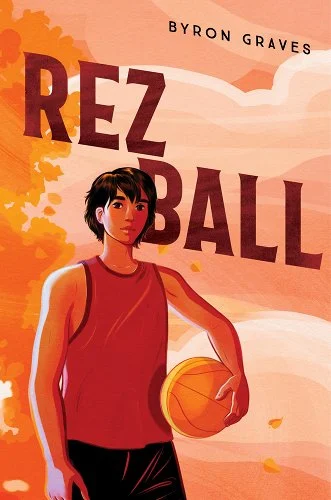
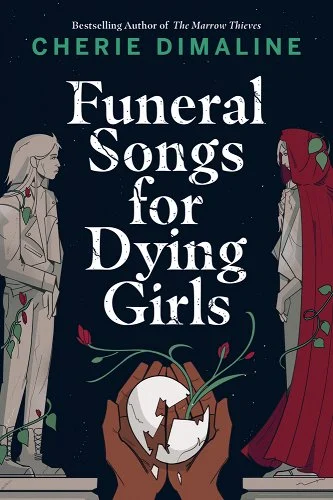
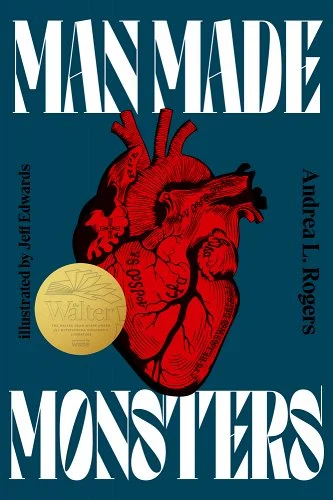


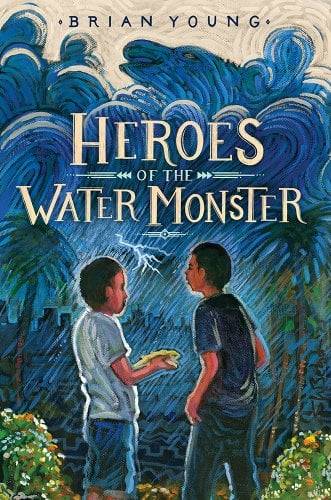
Congratulations to all of the 2024 American Indian Youth Literature Award honorees! These are the Medalists and Honor books in the YA category.
#Americn Indian Youth Literature Awards#Rez Ball#Byron Graves#Funeral Songs For Dying Girls#Cherie Dimaline#Man Made Monsters#Andrea L. Rogers#Jeff Edwards#Warrior Girl Unearthed#Angeline Boulley#Running With Changing Woman#Lorinda Martinez#Heroes of the Water Monster#Brian Young#are all of these middle grade? No#but I will not be pedantic I will focus on how freaking pretty they all look together and how happy I am for people#ALA Youth Media Awards
149 notes
·
View notes
Text

An illustration made after French author Villiers de l'Isle-Adam's short story 'Vera'. Maybe I'll do a comic based on it.
#illustration#black and white#indian ink#19th century#1800s#funerals#gothic#gothic art#literature#french literature#2023
17 notes
·
View notes
Text

"In my culture, death is not the end...It is more of a stepping of point."
- my headcanon funeral dress for T'Challa, inspired by Shuri and M'Baku's outfits. He wears this for his father's funeral. 🦢 Please do not repost. 🦢
#tchalla#world of wakanda#wakanda forever#black panther wallpapers#Black panther wakanda forever#Black panther art#digital aritst#Artists of color#Brown artists#artists of color#digital art#inspo#shuri#black panther#black panther fanart#indian artists#black panther wakanda forever#Funeral#Nakia#Mbaku#queen ramonda#my art
39 notes
·
View notes
Text
*aggressively does research at work for planned one shot for a ship that no one else has written for*
#sally speaks#looking up Hindu funeral practices for the Hemita one shot I'm planning#and praying i don't get canceled if i get something wrong lol#the things i do for accuracy#also Susmita is an Indian Telugu Hindu because her VA is and i need a reference point to go off of#so we had to look into that do#look i am doing everything i can to not offend or misrepresent my baby Susmita#yes i care about this way too much lol
4 notes
·
View notes
Text
there's another interesting distinction that could've been made here. French has separate words for 2 types of vegan :
végan·e describes a total vegan lifestyle. so not eating any animal products, and also not using any animal products, eg. no leather shoes or wool sweaters or beeswax candles
while végétalien·ne describes the vegan diet. not to be confused with végétarien·ne which is vegetarian as in no meat, but eggs and/or dairy could be oké
#technically pescetarian#I'm mostly vegetarian but will eat fish to be polite#I used to be vegan until my great aunt died and we went to the funeral in a rural village in the countryside#and the choice was basically don't eat for 14 hours or have some egg and dairy#and eggs I think are a pretty sustainable product if you get it locally (and the extra protein does help) and also honey#so yeah. not vegan anymore#of course I grew up eating meat#I was going to say 'like most Africans' but tbh most cultures in the world are pretty meat-centric#except like Indian and Ethiopian off the top of my head. they have good and diverse veggie options
1K notes
·
View notes
Text

Are you hiring Tamil funeral directors in Uxbridge? Count on us for reliable services. We have been in this particular industry for many years thus ensuring all your concerns are covered efficiently. We make every arrangement for this funeral. For more information, you can call us at 020 8909 3737 or 07737 051232.
#hindu funeral directors near me#buddhist cremation service#hindu funeral in south london#asian funeral service london#hindu funeral wandsworth#tamil funeral service kenton#indian funeral directors near me#hindu funeral service london#islamic burial london prices#indian funeral service in wandsworth
0 notes
Text
i actually dont work tomorrow. like knowing before hand. what is this. i havent known this feeling in eons.
i texted my bestie. we're going to get indian food. and then maybe ikea. idk what do people do for fun nowadays smh
#i havent had a genuine day off since christmas#ive called off once or twice but thats it#and i had those four days off but that was for funerals and i had to deal with my bio parents so those dont count#idk what imma do#also hasan was talking about indian food on stream the other day and ive been craving it ugh
0 notes
Note
i was just wondering, do you know of any ways we can support nex's family? im stuck on my phone atm but i would love to send some support
here’s is the family’s gofundme for the funeral, but they’ve already far surpassed their goal. like. three times what they were asking for, which is wonderful.
if you’re looking for other places to donate, there is the american indian college fund, which is exactly what it says, a nonprofit that works on sending indigenous kids to college and i think they even have some colleges of their own. nex was a part of the choctaw nation(i think there was confusion because they lived on a cherokee reservation?) and will never go to college, but it’s a good place to donate nonetheless.
there is also freedom oaklahoma, which is an advocacy group from nex’s state that focuses on queer/trans rights i believe from an indigenous and anti-colonization perspective. on that page they have a donate button as well.
if anyone else has more organizations they’d like to promote, i’d appreciate it.
#man i have friends in that state#theyre white and cis and safe but. still its fucking with me#i’m not removed from this one#our queer experience#nex benedict#mutual aid#transphobia#racism#trans activism#indigenous activism#asks
5K notes
·
View notes
Text
Amrityum is a Free Obituary and Memorial portal in India.
WhatsApp +91 755 89 00 111 your loved one’s obituary information: Full name, age, place, district, date of death and funeral arrangements: date, time and place.
.
Create, Publish & Share yourself FREE Death Notices & Funeral Arrangements, enduring Memorials & In Memory Announcements of your deceased loved ones on Amrityum. Preserve & cherish precious memories about your deceased loved ones, preserving their legacies for generations to come.
.
Please follow Amrityum for more updates and posts.
.
If you like Amrityum posts, please do share.
#hyderabad#delhi#chennai#funeralinformation#ripkerala#ripindia#noida#pravasi#keralagram#keralaabroad#indiansabroad#amrityum#mallu#indians#memorial#obit#in memoriam#funeral#obituary
0 notes
Text
https://sukhantfuneral.com/
#funeral services in mumbai#antim sanskar seva mumbai#antim sanskar seva service in mumbai#cremation services in mumbai#hindu funeral services in mumbai#funeral arrangement services in mumbai#preplan funeral services in mumbai#service for funeral in mumbai#hindu antim sanskar in mumbai#antim sanskar services in mumbai#mortuary services in mumbai#hindu funeral services#hindu funeral services near me#indian funeral services#hindu cremation services near me
1 note
·
View note
Text


The crowds that met them [Soviet delegation] in Calcutta were larger than had come out even for Gandhi’s funeral. The Indians liked the Russian informality. They liked it when Bulganin, finding the garlands they hung on him too heavy, tossed some on the necks of his hosts. They liked it when Khrushchev grabbed a peasant's sickle and showed that he, too, could reap. They especially liked it that distinguished foreigners adopted Gandhi caps and the Indian style of greeting, hands folded as if in prayer, instead of the Western handshake. “Why has no Westerner done this before?” they asked. The answer seemed clear. No Westerner had seen Indians as equals or copied in courtesy their manners in their own land. The Russians seemed to do it naturally.
Anna Louise Strong.
176 notes
·
View notes
Text
You know what doesn't make sense about Stephen King using the "Indian burial ground" trope regarding the hotel. He also says that the hotel was made around the early 1900s and the builders had to "fight off" Natives protecting the grounds, but a lot of the tribes that traditionally lived in that area were plains or somewhat nomadic, and a lot of nomadic Tribes would hold funerals for dead bodies near where they died, leave the body there, and then any other nomadic tribes would know not to camp there until there was no trace of the body.
So how is it an "Ancient Indian burial" ground.... on top of a mountain? That isn't really a prime location for making camp (thus someone likely wouldn't have died there, nevermind it being a large graveyard) save for maybe like very specific circumstances. And King's story is insinuating there were still Natives there & still living very traditionally despite such practices being illegal. A lot of tribes were also displaced to Reservations at this point. This leaves us with several options for explanation:
The Overlook manager was full of shit & that wasn't actually a burial ground there but he's playing up the history of the hotel & that also explains the appropriation of Indigenous art within the hotel
The location of the Overlook hotel was not built on specifically a burial ground but the mountain & area itself held some kind of special cultural/spiritual significance to the tribes there, who likely protested in some way of the Overlook being built there because of that but not exactly in the way it was described
In King's world, there was a Native American reservation located there (& this would explain Native people living in such a weirdly specific area & wanting to defend it) that the Overlook hotel then trespassed on solely to build a hotel & this reservation is never brought up or elaborated upon but no longer exists
The builders of the Overlook happened upon a Nation of tribe/s living on that mountain that were still living traditionally as in pre-contact despite the U.S laws a la Last of the Dogmen & maybe there WAS a burial ground there because of that isolation but the Hotel management pushed this Indian Nation out solely to build a hotel
All of these explanations are crazy but the REAL answer is that King used faux Indian mysticism to explain why this hotel is cursed because of laziness & left it at that
118 notes
·
View notes
Text
I'm creatively blocked, in fact I want to draw lots of things, but I can't. So some friends invited me to a minecraft server, so that I could remodel two villages. The first being GreenHill and the second being Sienna, so I tried these things out, I hope you like this.
GreenHill
I tried something medieval, I like this little cathedral. Behind it is a tomb where I held a funeral for a banished member, his coffin is a chest wrapped in badrock with his bones and flowers.
There is a crypt containing a wooden pickaxe modified by code, it mines very well, but practically blinds you with various negative statuses.
In front of the cathedral there are unknown ruins with no purpose, ignore the huge anomaly in the sky, it's another player's creation.
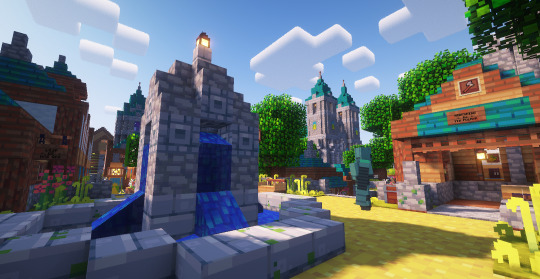

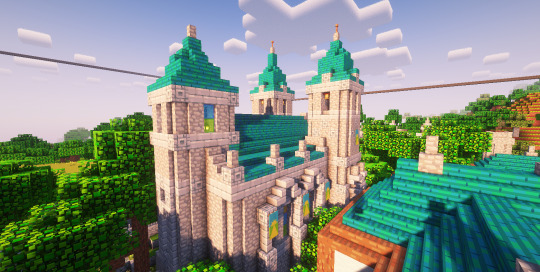
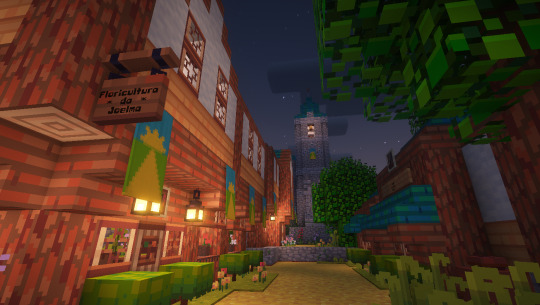
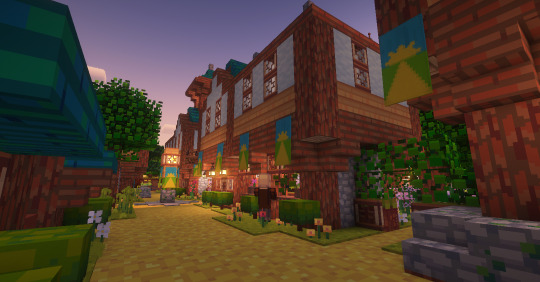
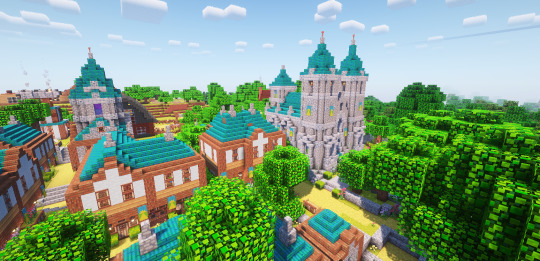
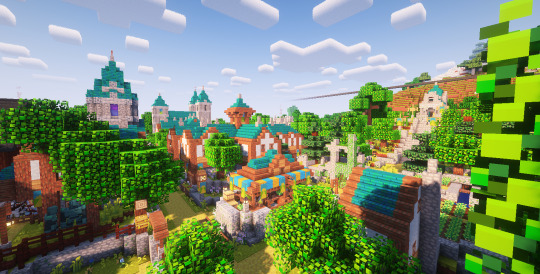

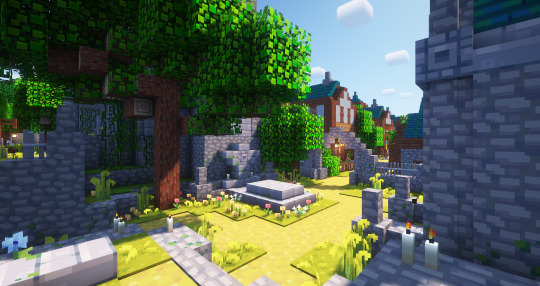
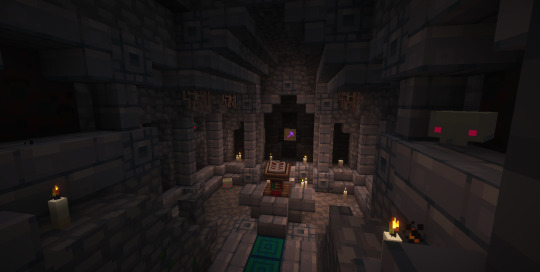
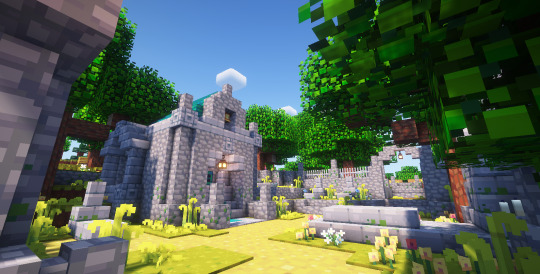

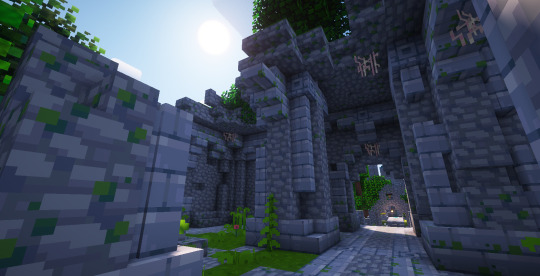


Sienna
I tried something Arabic or Indian. Its name comes from a mythical city from my friend's RPG session, he explained to me that Sienna was a city with a lot of knowledge that just disappeared in the blink of an eye, something like the idea of atlantis, so that's how Sienna appeared in my imagination.
There is this attempt at a great celestial observatory, there are books in which I left a written story about the origin of Sienna, which would be due to the passage of a mysterious comet that through whispers and dreams, inspires artists and intellectuals to creative insights, so the city was built with the purpose of understanding the mysteries about this comet in addition to accumulating the knowledge that it brought with its presence. But maybe there is something sinister about this comet.

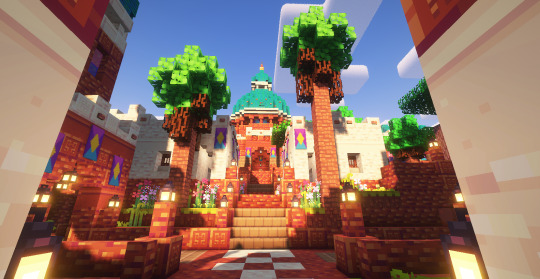

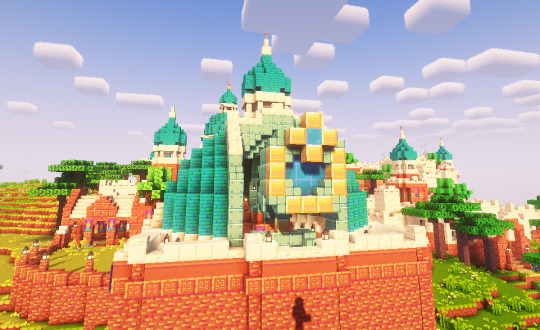
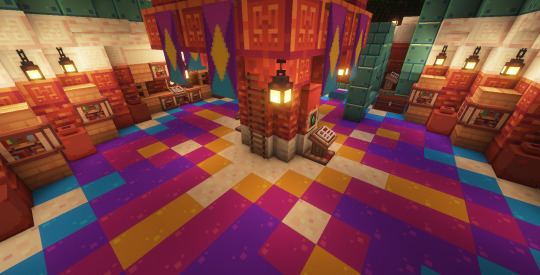
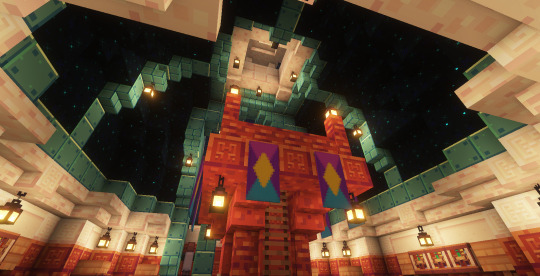
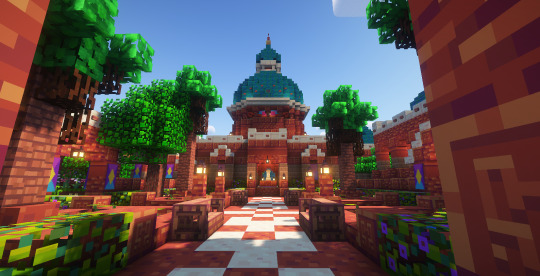


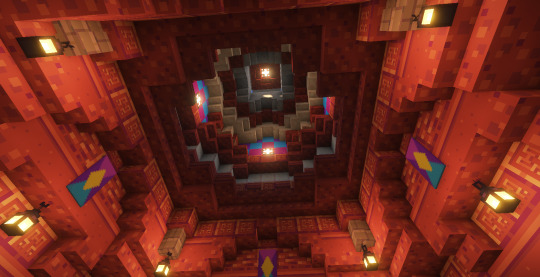
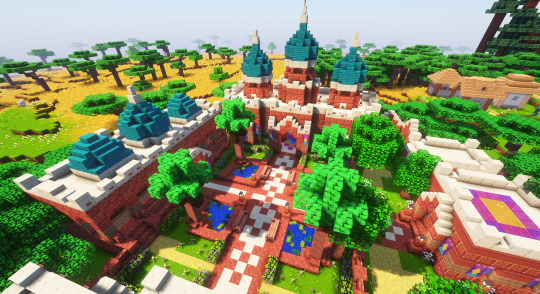
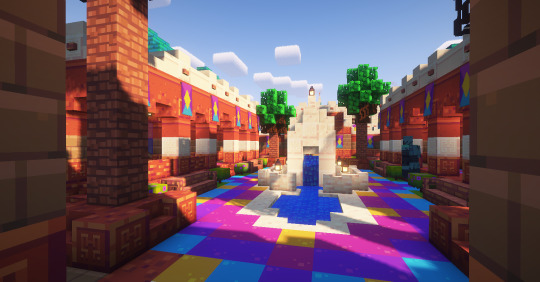
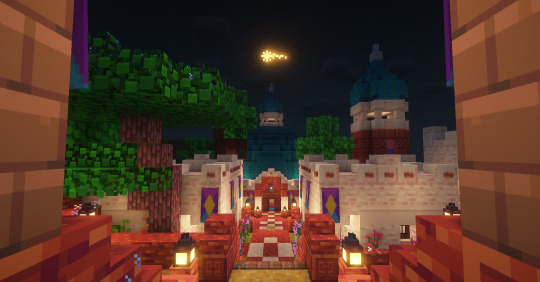
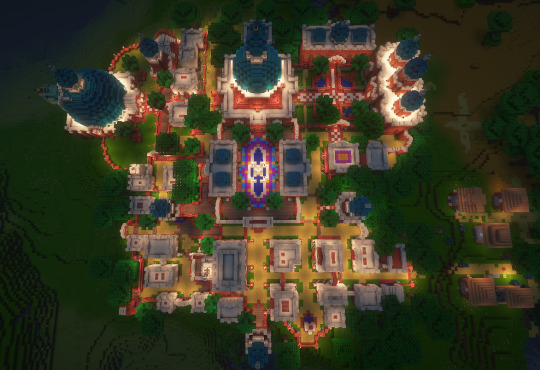
That's it, I don't know why I created all this, after I get sick of it it will just disappear along with the server at some point soon hehe, but it was fun. Oh, and the texturepack is called "Hafen"!
Now I need to get back to my little sharks.
346 notes
·
View notes
Text
Did you know that the first map of the Himalayas was made in the 1500s by the Catalan monk Antoni de Montserrat, and it was so accurate that it was used by European expeditions until the 1800s?
Here's the story of a priest that was called by a Mughal emperor for interfaith intercultural dialogue and who ended up being -among other things- a royal teacher, a writer, a geographer, a fake Armenian merchant, and a prisoner.
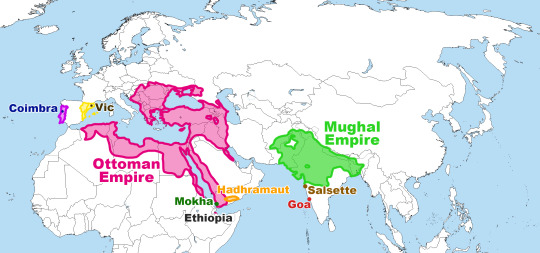
Antoni de Montserrat was born in 1536 in Vic (Catalonia). He studied in Barcelona (Catalonia) and Coimbra (Portugal) to become a priest and joined the Jesuits. In 1574, he was sent on a mission to Goa (back then a Portuguese colony, now part of India).
The Mughal emperor Akbar was an open-minded man. He was Muslim but wanted to learn about the other religions, so he called representatives of different religions to his court in Fatehpur Sikri. In 1579, he called the Jesuits to explain Christianity, and the Jesuits sent Antoni de Montserrat. Everyone in the court -Muslims, Christians, Buddhists, Hindus- knew that the point was not to convert others, but to reach a better understanding through debate.
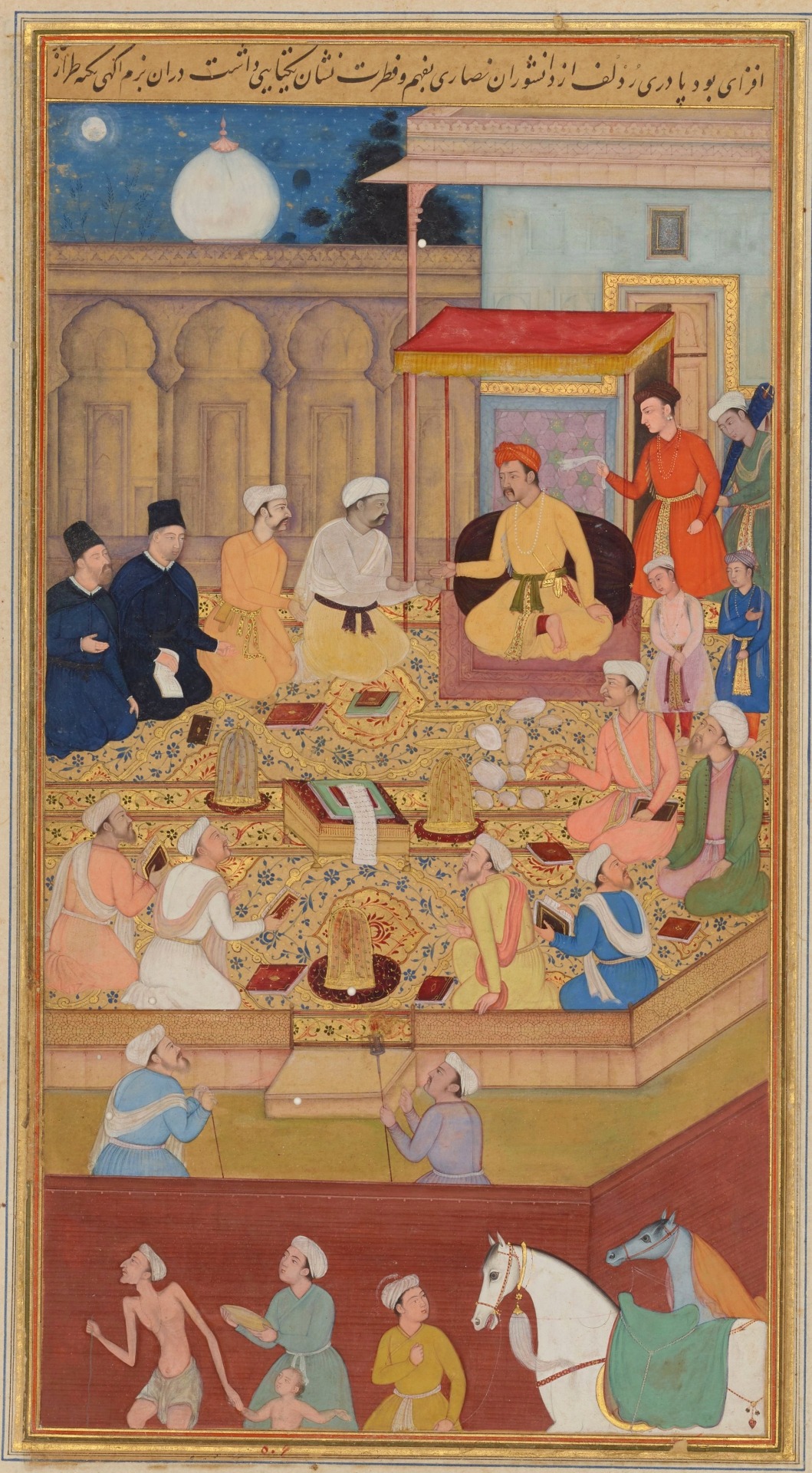
The Mughal emperor Akbar holding an assembly with religious men. The two men dressed in black are Jesuits. Miniature painting by Nar Singh, 1605. Chester Beautty Library.
The emperor Akbar valued Antoni de Montserrat as a great wise man and chose him to become the tutor of his second son Murâd. Antoni learned Persian (the language of the Mughal court) and accepted. He remained close to the emperor and accompanied him in the military campaign when the emperor's step-brother started an uprising in Bengala. Crossing much of Northern India, Kashmir, Pakistan, Afghanistan, and Tibet on elephant gave him the perspective to draw the map.
In the end, Antoni went back to Goa in 1582. There, he wrote a book explaining what he had seen in the Mughal Empire, the cultural differences he had experienced, the political organization of these territories, and describing emperor Akbar's court. This book is called Mongolicae Legationis Commentarius, and its descriptions of the lands he has travelled include the earliest description of Tibetans known in Europe since Marco Polo and the first ever map of the Himalayas.
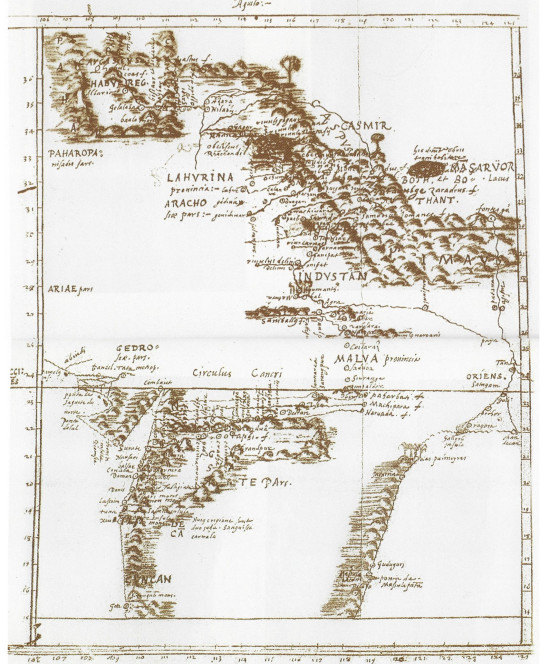
Antoni de Montserrat's map of the Himalayas and their surroundings, including large parts of what nowadays is India, Tibet, Pakistan, and Afghanistan. Library of St. Paul's Cathedral, Kolkata (India).
This book explains cultural elements of the different cultures under the Mughal Empire and also the conversations Antoni had with the emperor about certain habits. For example, Antoni writes about how the Brahmans (upper caste Hindu priests) force widows to be burned alive in the same funeral pyre as their dead husbands, often (when the women resist) drugging them or through violence. Antoni tries to get emperor Akbar to stop this terrible tradition, but doesn't succeed. On the other hand, Antoni also tells the emperor Akbar that they should burn the "men who dress as women" who live in the emperor's court, to which the emperor bursts laughing out loud and doesn't give any consideration to. Despite their different cultural backgrounds, Antoni and Akbar were friends.
Antoni's time in the Mughal Empire ended in 1588, when the king Philip II of Castilla and I of Portugal orders Antoni and a young Spanish priest named Pedro Páez to go to Ethiopia to convince the Coptic Christian Ethiopians to get closer to the Catholic Christian Church. Then, Antoni and Pedro dressed up as an Armenian merchants to border the Ottoman Empire through Iraq, Syria, and Egypt, trying to avoid the pirates of the Indian Ocean. However, before reaching Ethiopia, they took a ship to skirt modern-day Oman, but the captain turned them in as soon as they reached land in Yemen. Then, Antoni and Pedro were taken on a camel caravan to the Sultan of Hadhramaut (Yemen), who imprisoned them until 1595 and then sentenced to galleys in the Red Sea, and later imprisoned them again. Luckily for them, king Philip paid their rescue and they were freed in 1596. With his body weakened by the galleys and the mistreatments of prison, Antoni retired to a convent in Salsette (modern-day Mumbai, India), where he died in 1600 right after having finished his map.
The Spanish priest who travelled with him, Pedro Páez, also wrote his own diary explaining what they lived. With his descriptions, we know that in Yemen Antoni and Pedro were given what he describes as a kind of herbal tea called "cahua, water boiled with a fruit named bun and which is drank very hot, instead of wine": that is a drink that was still unknown in Europe at the time, which we now call coffee.
Maybe you have heard the name Pedro Páez before, too. After accompanying Antoni to Goa, he went to Ethiopia again, successfully this time. In Ethiopia, he became the first European to reach the source of the Blue Nile.
Information sources: David Montserrat Nonó (La Mira), Sociedad Geográfica Española. If you want to read Antoni de Montserrat's book, it has been translated from Latin to Catalan and to Spanish by Josep Lluís Alay.
#història#antoni de montserrat#pedro páez#mughal empire#mughal#history#catalonia#catalan#renaissance#european history#asian history#asia#india#indian history#interfaith#geography#1500s#16th century#travel#other countries
64 notes
·
View notes
Text
favourite poems of october
alfred starr a dark dreambox of another kind: the poems of alfred starr: "didn't you ever search for another star?
stephen spender new collected poems: "auden's funeral"
marianne boruch keats is coughing
noa micaela fields zoeglossia: poem of the week, may 17, 2021: "echolalia"
kevin young diptych
richard siken real estate
crisosto apache kúghą/home
mikko harvey for m
nathan hoks nests in air: "the barbed wire nest"
john a. holmes noon waking
crisosto apache 37 common characterisi(x)s of a displaced indian with a learning disability
oliver de la paz requiem for the orchard: "at the time of my birth"
zhang xun jiangnan song (tr. bijaan noormohamed)
paul violi fracas: "extenuating circumstances"
tianru wang after "yellow crane tower"
lloyd schwartz cairo traffic: "nostalgia (the lake at night)"
kamiko han the narrow road to the interior: "the orient"
rigoberto gonzalez unpeopled eden: "unpeopled eden"
adelaide crapsey verse: "to the dead in the graveyard underneath my window"
chester kallman night music
alan shapiro covenant: "covenant"
tom clark light and shade: new and selected poems: "radio"
tc tolbert my melissa,
charlie smith in praise of regret
carolyn kizer cool, calm, and collected: poems 1960-2000: "fanny"
julie sheehan orient point: "hate poem"
arthur sze the redshifting web: poems 1970-1998: "streamers"
joumana altallal everything here...in the voice of tara fares
abid b al-abras last simile
w.s. merwin to lingering regrets
george scarbrough music
shout me a coffee
#tbr list#poems#poetry#poetry list#poem list#poet#poets#alfred starr#a dark dreambox of another kind#didn't you ever search for another star?#stephen spender#new collected poems#auden's funeral#marianne boruch#keats is coughing#noa micaela fields#echolalia#zoeglossia#oliver de la paz#requiem for the orchard#at the time of my birth#paul violi#fracas#extenuating circumstances#lloyd schwartz#cairo traffic#nostalgia (the lake at night)#rigoberto gonzalez#unpeopled eden#tom clark
221 notes
·
View notes
Text
The Plight of Indian Widows
A woman's dignity is not her own possession. Her life is at the mercy of men around her. She is a commodity to be owned and sold first by her father then her husband. Her entire existence is tied to her servitude to those around her. After giving so much to the world, there is little life left inside of her. Yet, the world still demands her forfeit of this little life after the death of her husband. In India, a woman was expected to burn herself alive in the holy pyre of her husband's body as a show of loyalty in a practice called Sati that was outlawed in 1929(yet it is still rampant today in many rural parts of India).
With her husband no more, she must have no reason to live.Widowhood is the harbringer of acute discrimination for women in South Asia. Widows are ostracized by society and shunned by their family to live a destitute life in "Vidhwa Ashrams". Even the shadow of a widow was believed to inflict depredation and brought. They are called witches and man-eaters. They are forbidden from wearing anything but white clothes and are expected to practice strict abstinence. Widows in Afghanistan are called besarparast, meaning "household without a head". It is customary for a woman to shave off her head to appear undesirable. Her sexuality is confined, her needs and wants must die alongside her husband. Widow remarriage-although legal- is deeply stigmatized as a grave sin.
Widows are not considered to be a part of society. They can neither celebrate festivals nor travel without a religious purpose. In some extreme cases, they are made to drink the bathwater of their husbands’ dead bodies and have unprotected sex to "cleanse themselves of the sin of causing their husbands" death. Young widows also fall prey to the leering eyes of men. Child brides especially are prone to fall victim to manipulation by people around them. Men consider that since marriage has taken away her "innocence", she can now be sexually exploited.
Barring a few states, married women cannot inherit their husband's property. This lack of financial stability is the root cause of their exploitation. Most husbands leave their wives penniless. What little savings he might have had are spent on funeral rites. Relatives do not want to support her financially, considering her children and herself as excess baggage. Her parents also close the doors on her face for it is often said - "only a woman's dead body should come out of her husband's house."
This new found vulnerability makes her an easy prey for prostitution. A primary form of survival for widows is to sell their body through pimps. However, in most ashrams, they are forced to perform sexual favours by the heads of the ashram to gain money. The heads use their political power to silence the widows from raising their voice against this rape. With nowhere else to go, this cycle continues. The widows who get pregnant from this rape are "mauled by quacks for a painfully searing abortion and If that’s not done, then they would have an extra mouth to feed and an extra pair of hands to beg."
As of today, India is the abode of 42 million widows-a social class that is woefully exploited. Widows are often forced to dedicate the remaining parts of their lives to their religion. They must have no desires or wants except singing the God's praise. Widowhood for most women marks the death of their happines and social life. Although with changing times the attitude towards widows is turning positive, it is the bitter truth that the condition of widows from orthodox regions live a terrible life.
Laws protecting women are scarce- let alone widows. In India, widows are considered to be the class 1 heirs of ancestral properties. However, most of them are uneducated and unaware of the laws surrounding them. They are easily manipulated by relatives to give up their rights to the property. As for self acquired property, most men do not mention the name of their wives in their wills. After 2005, women alive on december, 2005 have a right over their father's ancestral property alongside their brothers. One must not forget that women inheriting property is still not socially acceptable in India and women who recieve property are few and far between.
To uplift widows, one must make them aware of the rights around them. Government and local NGOs should work together to organize awareness campaigns on the rights of widows. Women without capital left behind by their husbands should get a monthly stipend. "Vidhwa Ashrams" should be heavily regulated. More so, the social stigma shrouding widows must be removed. Treatment of women belonging to marginalized communities are a reflection of how dire the situation of women's rights are in India. Opening women owned women only shelters is the prime solution for the upliftment of women.
#radblr#radical feminism#radical feminists do interact#radical feminists do touch#terfsafe#radical feminist safe#trans exclusionary radical feminist#female seperatism#women are the superior sex#widows#india#Patriarchy#male violence#male privilege#sexism#gender roles#womens rights
67 notes
·
View notes